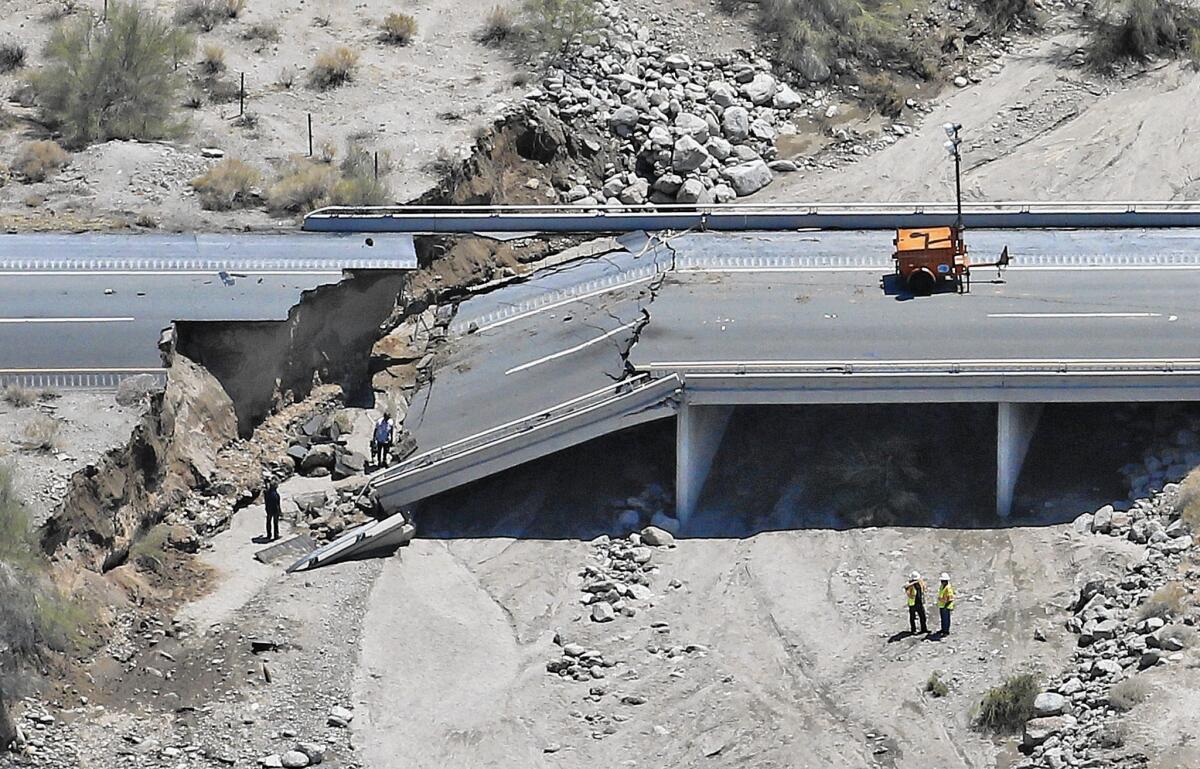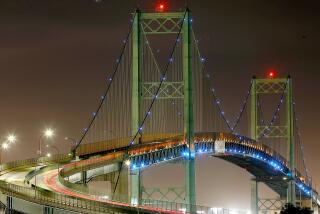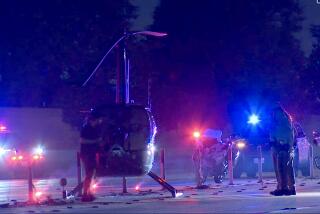Trucking industry on losing end of I-10 bridge shutdown

- Share via
Czeslaw Pasionek was about five miles from the Chiriaco Summit exit near the top of a hill when traffic on Interstate 10 started to slow.
The eastbound bridge near Desert Center had collapsed, the casualty of Sunday’s flash floods. It would take the ABF Freight System Inc. driver almost two hours to turn his truck around and take an alternate route, which included a winding, two-lane freeway with rough roads. What should have been a 5½- or six-hour trip from San Bernardino to Phoenix turned into almost 10½ hours.
“I’ve been at road closures before, but not this major,” Pasionek said.
More than 3,100 truck drivers travel on I-10 between Coachella and Arizona each day, according to Caltrans. These drivers are now being re-routed dozens of miles off-course, resulting in hours-long delays.
Trucking companies rely on the freeway as the most direct route to move goods to and from the California ports. Of the 27,000 vehicles that traverse the freeway between Coachella and Arizona, about 11.5% are trucks, according to Caltrans.
“It’s a hugely important corridor for commerce,” said Tony Bradley, president and chief executive of the Arizona Trucking Assn., which has more than 300 member companies.
The bridge will reopen Friday, and vehicles will be diverted to the westbound bridge, which was strengthened to accommodate two-way traffic, according to Caltrans. Work will continue on the eastbound bridge until it is functional.
The hours-long detours have led to lost productivity for the industry. A shipment that would usually take a day or less may now arrive in two days, said R.J. Cervantes, director of legislative affairs for the California Trucking Assn., which has about 1,500 carrier members.
Bradley and Cervantes said they hadn’t heard of any shipments being canceled.
According to federal regulations, truck drivers are allowed to drive only a certain number of hours per day, so detours hinder a driver’s ability to get to a destination on time, Cervantes said.
Delays will show up in shipment costs. Truck drivers are paid by the mile, and when they are rerouted several hundred miles, those costs increase, Bradley said.
The American Transportation Research Institute, whose estimates are higher than Caltrans’, said 8,000 trucks travel along the 50-mile I-10 closure each day, based on data from the Federal Highway Administration. Normally, the daily operating cost for all of the trucks on this stretch is $670,400. But with the detours in place, it will cost an additional $2.5 million a day.
Mountain Valley Express is already seeing the effect of these costs.
The trucking company hauls freight nightly on the I-10 between California and Phoenix, and relied on the freeway to make overnight shipments, said Scott Blevins, president and owner of the company. The detours have affected 10 of their trucks, and overnight shipments now take two days to arrive.
“It obviously impacts our costs — our fuel usage, our drivers’ hours,” he said. “The biggest impact is to our customers that need their product overnight. They’re not getting that right now.”
More to Read
Inside the business of entertainment
The Wide Shot brings you news, analysis and insights on everything from streaming wars to production — and what it all means for the future.
You may occasionally receive promotional content from the Los Angeles Times.











